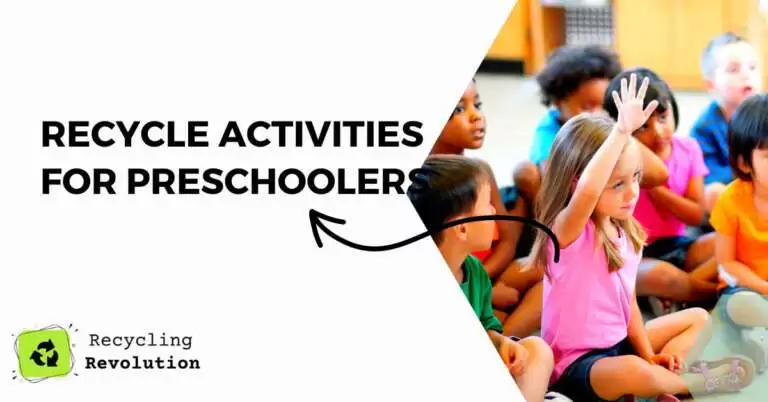In today’s rapidly changing environment, it’s paramount to instill eco-friendly habits in our youngest generation. Recycling, a crucial component of sustainable living, can seem a complex topic for tiny tots.
However, I’ve seen time and again that with the right activities, even preschoolers can grasp the essence of recycling, its importance, and more importantly, actively participate in it.
tl;dr: Introducing recycling to preschoolers can be a fun and engaging learning experience. With hands-on activities and real-world application, kids not only learn about the importance of recycling but also develop lifelong eco-friendly habits.
Why Start with Preschoolers?
Kids have an innate curiosity and a powerful capability to absorb information. Studies have shown that children are more likely to carry habits developed at a young age throughout their lives. Introducing recycling concepts early on provides them with an understanding of the environment and their role in protecting it.
Note: It’s never too early to foster an environment-friendly mindset!
Hands-on Activities
1. Craft Projects Using Recycled Materials
I recommend starting with fun craft projects using materials you would typically discard. Think old newspapers turned into paper mâché sculptures, or empty plastic bottles transformed into beautiful flower vases.
This approach allows kids to see the potential in items that are usually thrown away, nurturing creativity and promoting sustainability.
2. Sort It Out!
Create a game where kids sort items into different recycling bins. Using colorful bins with labels like “Plastic,” “Paper,” and “Metal,” encourage them to categorize various recyclable items.
It’s a hands-on way to make them understand the basics of recycling. Plus, it’s a fun game!
3. Visit a Recycling Plant
Although not an in-house activity, taking preschoolers on a short field trip to a local recycling plant can be incredibly educational. Here, they can see firsthand how collected materials are processed and transformed. Observing the machinery and processes can be fascinating for little minds!
Making Learning Fun with Stories & Songs
Interactive stories and songs make learning exciting. I recommend using books like “The Adventures of a Plastic Bottle” or catchy songs that revolve around recycling. These provide a context for kids and allow them to relate to the process in an enjoyable manner.
Note: There are numerous resources online, both free and paid, that cater to environmental education for kids.
Tracking and Rewards
A progress chart where kids can track their recycling efforts weekly can be quite motivating. You can add star stickers or other rewards when they achieve certain milestones.
For instance, if they remember to recycle their juice carton for a week straight, they get a star!
Sharing the Message
Encourage kids to share what they’ve learned with their friends, family, and neighbors. It not only reinforces their knowledge but can also have a ripple effect, inspiring others to recycle as well.
The Science Behind It All
When introducing the topic, it’s essential to keep it simple. Preschoolers don’t need in-depth knowledge about greenhouse gases or landfills. However, you can simplify it by explaining:
“Recycling helps our planet because it means fewer trees are cut down, and there’s less trash in our parks and oceans. This makes Earth happy and keeps animals safe!”
Recent studies have shown that when children are educated about recycling, they’re more likely to influence their families to recycle more effectively. This ripple effect demonstrates the power of educating our youngsters about these critical issues.
The Benefits of Recycling for Young Minds
While the primary goal of introducing recycle activities to preschoolers is to foster a sense of environmental responsibility, there are other underlying benefits worth delving into:
Development of Critical Thinking Skills
When children are tasked with figuring out which bin an item goes into, or how to turn a recyclable material into a craft, they are sharpening their problem-solving and critical thinking skills.
Deciding what to do with an item, understanding why, and considering the consequences are all processes that foster decision-making capabilities.
Boosting Creativity and Innovation
Think about it: giving a child a blank canvas can sometimes be overwhelming, but hand them an empty cereal box, some fabric scraps, and old buttons, and suddenly, the possibilities are endless.
By using recycled materials in craft projects, children are encouraged to think outside the box—literally and figuratively!
Enhancing Social Responsibility
By understanding that their actions, like recycling, can have a positive impact on the world around them, children develop a sense of social responsibility. This realization—that even at a young age, they can make a difference—can be incredibly empowering.
Advanced Activities for the Eager Learner
For those children who display a heightened interest or seem ready for more advanced activities, consider the following:
Eco-Friendly Gardening
Teach kids about composting by starting a small compost pile or bin. They can add fruit and vegetable scraps, observe the decomposition process, and eventually use the compost to nourish a garden.
Gardening itself, using recycled containers as pots or creating bird feeders from old milk cartons, can further their understanding of the recycling circle of life.
DIY Recycling Station
I recommend setting up a dedicated recycling station at home. Let your child be in charge (with supervision, of course).
They can create signs for different materials, and as a weekly activity, you both can visit the station to see what’s been accumulated and discuss the potential recycling outcomes for each item.
Upcycling Challenges
Introduce the concept of upcycling. Challenge your child to come up with a new use for something old. For instance, can they transform an old T-shirt into a tote bag or pillowcase?
Such activities not only boost creativity but also reinforce the idea that many items have more than one life if we think innovatively.
Real-world Connections: Recycling Beyond the Home
While starting the recycling journey at home is fantastic, it’s also beneficial to show kids how these concepts apply in the broader world:
School Recycling Initiatives
If your child’s preschool doesn’t already have a recycling program in place, consider approaching the administration about starting one. It can be as simple as placing paper recycling bins in classrooms or as elaborate as organizing school-wide recycling challenges.
Community Involvement
Participate in community clean-up days or recycling events. This not only provides a practical application for what they’ve learned but also instills a sense of community involvement.
Recycling-Themed Playdates
Organize playdates or group activities centered around recycling. Maybe it’s a craft day using recycled materials or a treasure hunt where kids search for specific recyclable items. Making it social can amplify the fun and learning!
Conclusion
Recycling can be super fun for little kids! By playing sorting games, making cool crafts from old stuff, and maybe even seeing where recycling goes, preschoolers can learn to love recycling.
They’ll understand that it helps our planet by keeping it clean and safe for everyone. Plus, they get to be creative and solve problems while they play. If they start now, they’ll keep recycling as they grow up. It’s like turning trash into treasure and making Earth smile at the same time!
FAQ
How early can I introduce recycling to my child?
As soon as they begin to show an interest in their surroundings! Simple activities can be introduced as young as two or three.
What if my child isn’t interested in the activities?
That’s okay! Children have varied interests. Try reintroducing the topic at a later time or through a different activity that aligns more with what they enjoy.
Are there any safety concerns I should be aware of?
Always supervise recycling activities, especially if using materials like glass or metal. Safety first!
Remember, the aim is not to make them recycling experts overnight but to kindle an interest and appreciation for our environment. Happy recycling!

